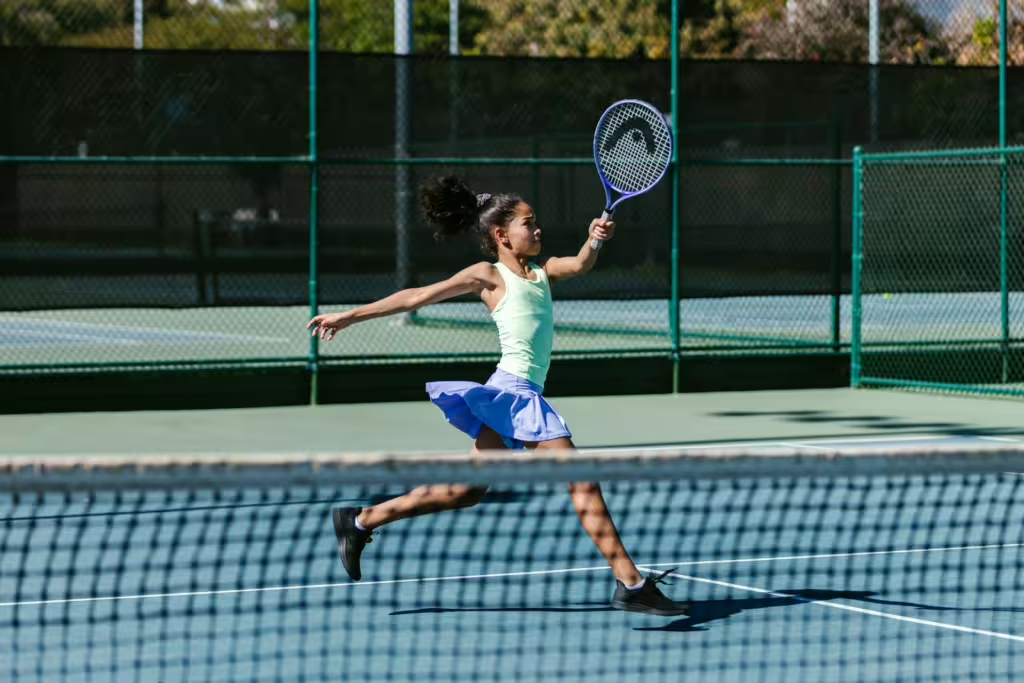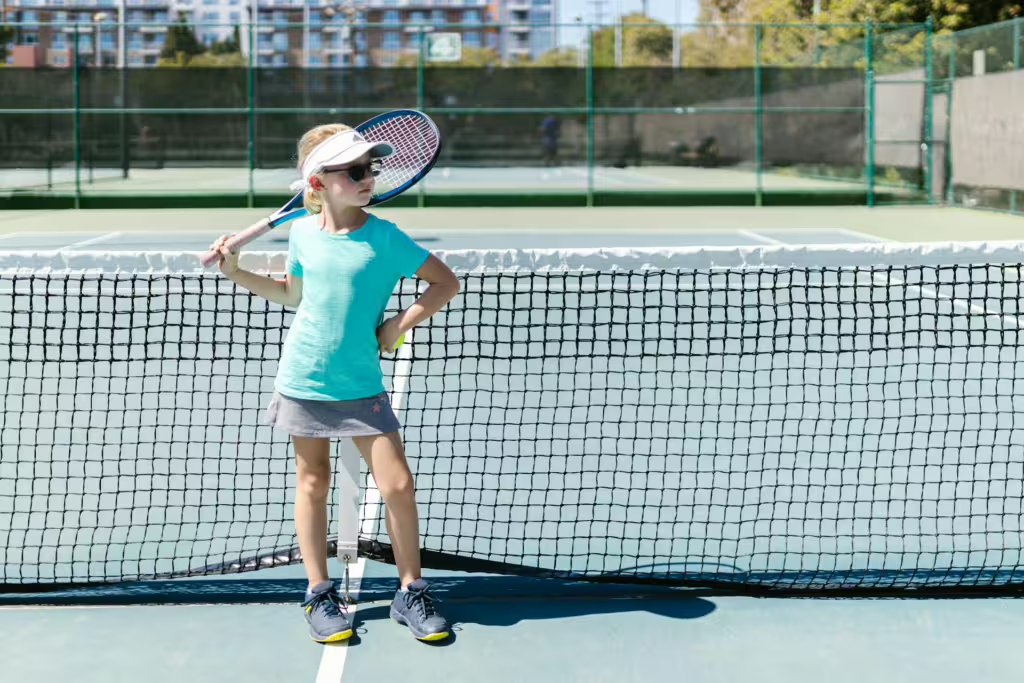As a parent of a young tennis player, it’s easy to understand that we want to see them succeed and thrive when they are on the court. More importantly, we parents want our children to feel confident, resilient, and ready no matter what challenges they are faced with; whether on the sports field or any other area of life. We use tennis in this example, not only because it happens to the subject of today’s article, but because of the unique physical and mental toughness it creates for young athletes.
Tennis is one of those rare sports where self-confidence plays a crucial role in how well a player succeeds. On the tennis court, one is generally on one’s own, so they need to be able to have faith in their own abilities. Even if it’s a doubles match, an individual tennis player is still responsible for their own moves, mind, and ability. Thus, whether they’re serving aces, rallying with an opponent, or dealing with the ups and downs of the game, a tennis player’s confidence will determine how well they ultimately perform.
Building confidence in your young tennis player is not just about developing their technique or winning trophies—it’s about teaching those athletes to believe in themselves. In this article, we will help you to teach your kids how to handle challenges and maintain a positive mindset during a tennis match, regardless of the outcome of that match. To do this, we will offer parents some practical ways that they can nurture self-confidence and help their children handle wins and losses with equal amounts of grace.
Focus on Effort, Not Just Results
Leading with a growth mindset is one of the best ways that parents can encourage confidence in any youth sport their child happens to enjoy. This means emphasizing effort over results, which is not something that isn’t always easy for children to understand. There will be wins in tennis, but there will also be losses, and the key is helping your child to understand that both are valuable in their own way. Moreover, by praising your child for their effort, dedication, and improvement, rather than just their victories, you can reinforce this concept.
It is the process of learning that matters here. Let your child know that simply by growing, by improving each and every time they play, they are building to something more important than any single win. In the end, that evolution of skill is just as valuable to them as the fleeting confidence they gain from a high final score.
At the same time, if your child does lose a match, try and avoid focusing on the loss itself. Instead, reframe the situation and openly recognize the effort the child put into their performance. Let them know that you noticed and appreciate how hard they worked to achieve their personal best. This type of positive reinforcement is invaluable to young children and helps them to believe that success is about growth and hard work, not just winning. Instead of saying, “You won the match, great job!” try saying something more along the lines of, “You played so hard today and showed great determination. I’m proud of how you stayed focused!”
Teach Positive Self-Talk
The way we speak to ourselves impacts our confidence levels as much, if not more so, than the way other speak about us. Parents can praise a child’s progress and determination until the cows come home, but it might not have the intended effect of the child doesn’t think highly of themselves. This is why it is so important that parents teach their kids about the importance of positive self-talk. Teaching them about why we do it and how to do it properly, can help them develop a more resilient mindset; one that will undoubtedly carry them through both victories and defeats at each important stage of their life.

Parents should encourage their children to replace negative thoughts with more positive, empowering internal chatter. Give them examples of affirmations, mantras, or statements that can help them reframe their way of thinking. For example, if your child misses a serve or hit a double fault, instead of thinking, “I’m terrible at tennis,” teach them to can remind themselves, “It’s okay to make mistakes. I’ll try again and do better next time.”
The key in all this is to help them understand that mistakes are part of the learning process, and a necessary one. Every pro player has made mistakes on their way to find success and fame. And frankly, most of those professional athletes would agree that each mistake was an opportunity for them to improve their game. Positive self-talk boosts a kid’s confidence and can help to greatly reduce the fear of failure.
Set Achievable Goals
Shooting for the moon sounds great, but we you needn’t be scientist to know that the moon is rather farther than even the most accomplished tennis player can hit in a single swing. When it comes to setting goals, the moon is obviously out of bounds, but by setting small, achievable goals that your child can accomplish, you are giving them something tangible to work towards. Meeting even the smallest of goals can help young tennis players a sense of accomplishment and build up their self-confidence in highly impactful ways. Whether that goal involves mastering a new technique, improving their serve accuracy, or winning a certain number of games during a match, it’s important that you and your child have clear, realistic goals in mind.
Finding the path to victory often means setting goals that are within the child’s control. Try out things like improving their footwork, maintaining focus during longer rallies, or staying calm when serving under pressure. When your child inevitably reaches these tiny goals, up the ante, but not before taking time to celebrate their accomplishments. Remember, these goals give young athletes a sense of pride and encourages them to continue pushing forward. Instead of keeping the goals solely about winning matches, try to set performance goals with them, such as improving their backhand.
Emphasize the Importance of Effort Over Winning
We all know how great winning can feel, but it’s important for children to understand that winning isn’t everything; especially when they first get involved in youth sports. Parents should always try and teach their children to appreciate the experience, effort, and progress rather than the result of the match. Sure, we want them to succeed, as we stated earlier, but we also want them to develop and maintain a healthy relationship with competition. Parents can achieve this by helping their child to focus on aspects of their game that they, themselves can control, such as their attitude, effort, and perseverance.
When they do win, remember to celebrate their effort and skills. When they lose, which we know is bound to happen, make sure that they focus on what they learned and how they can improve for the next time. This balanced approach builds a child’s emotional resilience and keeps their confidence intact, even if it gets a bit banged up by the loss.
Model Resilience in Your Own Attitude
Kids look up to us, whether we want it or not. This is one of the most challenging aspects of being a parent, and as flattering as it is, it also puts an awful lot of pressure on us. This is because most of us understand that our behavior, good or bad, can influence how our children see the world. It can also influence how they approach challenges on the sports field.
Many of us sports parents do what we can to model a positive attitude toward both winning and losing. We were young once, we know how both feel. We also probably remember how our own parents made us feel in those situations, which is why it falls to us to teach our kids how to handle their emotions in a constructive way. Remember, if you see a loss as a learning experience, your child might eventually learn to see it the same way.
For instance, if your child loses a match, do your best to avoid expressing frustration or disappointment with them. Instead, focus on positive emotions. Express how proud you are of their effort on the court and encourage them to try and learn from the experience. If your child wins, help them to remain humble and remind them that every victory is an opportunity for them to improve further. Whenever possible, stay calm and composed. By doing so, you teach your child that it’s not just about the scoreboard, but about handling the emotions that come with either outcome.
Celebrate Both Wins and Losses
While it’s important that parents celebrate victories with their kids, it’s important that they don’t forget to recognize the effort that child put in, as well as any lessons they may have learned from a previous loss. Losing can be hard for anyone, but it’s especially difficult for kids. Most importantly of all, it is an inevitable part of the sport. Parents can help their kids to accept such losses as opportunities to grow and improve. At the same time, it’s important to highlight and even celebrate the fact that your child had the courage to step onto the court in the first place, not to mention face the challenges they met there, and the fact that they gave their best effort to succeed.
Parents should feel free to encourage their child to reflect on the match and identify what they can do to improve before the next round. Reinforce the idea that each loss a person experiences is a stepping stone towards becoming a better tennis player. With the right mindset, a loss can be just as valuable as a win in when it comes to building confidence and skill.
Encourage Team Support and Sportsmanship
Tennis may be an individual sport, but that doesn’t mean your child is alone on their tennis journey. Parents should encourage their kids to be social, be kind, and build positive relationships with their fellow teammates. At the same time, it’s a good idea to have a good relationship with coaches as well; this is for parents, too. Parents should feel good about who they have teaching their child and be able to speak openly with them on matters of practice, technique, and performance. Having any sort of strong support system can help boost a young person’s confidence and provide emotional support, often when the chips are down and they need it the most.
One way to ensure good relationships between your child and their peers is to teach them how to be both a gracious winner and a respectful loser. Sportsmanship plays a significant role in how a young athletes handles success and failure. You may not realize it, but when your child treats their opponents with kindness and respect, regardless of the result, they will often feel proud of themselves and their actions, which will only serve to further boost their confidence.
Provide Encouragement, Not Pressure

While it’s important to support your child’s tennis journey, you will want to avoid putting unnecessary pressure on them. Parents should instead focus on making their child’s tennis journey a more fun and positive experience, rather than a stressful one. When your child feels pressured to win, it can have the opposite effect, leading to anxiety, frustration, and a lack of confidence. This is why we always encourage fun over wins!
Cultured Athlete Says…
As you can see, building a child’s confidence in tennis is a combination of nurturing a positive or growth mindset, setting realistic goals, celebrating effort, and teaching them how to handle wins and losses with equal aplomb. As with most sports, the focus should be on the child’s growth as individuals and athletes, as this will be the best way to have them develop the self-belief they need to succeed—not just in tennis, but in all areas of their life. With parental support, even the most unsure child can become a stronger player, as well as a more resilient one. Giving them the tools they need to succeed in sports will make them a more confident person, one who knows how to handle challenges with poise and determination.
Discover more from CulturedAthlete
Subscribe to get the latest posts sent to your email.






